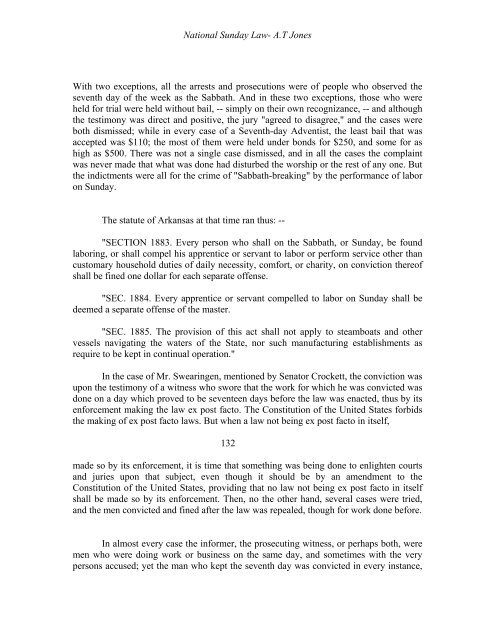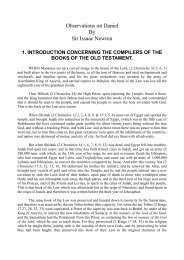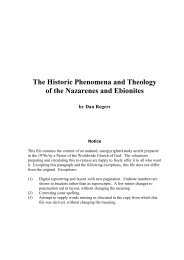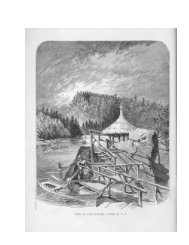THE NATIONAL SUNDAY LAW, ARGUMENT OF ALONZO T ...
THE NATIONAL SUNDAY LAW, ARGUMENT OF ALONZO T ...
THE NATIONAL SUNDAY LAW, ARGUMENT OF ALONZO T ...
Create successful ePaper yourself
Turn your PDF publications into a flip-book with our unique Google optimized e-Paper software.
National Sunday Law- A.T Jones<br />
With two exceptions, all the arrests and prosecutions were of people who observed the<br />
seventh day of the week as the Sabbath. And in these two exceptions, those who were<br />
held for trial were held without bail, -- simply on their own recognizance, -- and although<br />
the testimony was direct and positive, the jury "agreed to disagree," and the cases were<br />
both dismissed; while in every case of a Seventh-day Adventist, the least bail that was<br />
accepted was $110; the most of them were held under bonds for $250, and some for as<br />
high as $500. There was not a single case dismissed, and in all the cases the complaint<br />
was never made that what was done had disturbed the worship or the rest of any one. But<br />
the indictments were all for the crime of "Sabbath-breaking" by the performance of labor<br />
on Sunday.<br />
The statute of Arkansas at that time ran thus: --<br />
"SECTION 1883. Every person who shall on the Sabbath, or Sunday, be found<br />
laboring, or shall compel his apprentice or servant to labor or perform service other than<br />
customary household duties of daily necessity, comfort, or charity, on conviction thereof<br />
shall be fined one dollar for each separate offense.<br />
"SEC. 1884. Every apprentice or servant compelled to labor on Sunday shall be<br />
deemed a separate offense of the master.<br />
"SEC. 1885. The provision of this act shall not apply to steamboats and other<br />
vessels navigating the waters of the State, nor such manufacturing establishments as<br />
require to be kept in continual operation."<br />
In the case of Mr. Swearingen, mentioned by Senator Crockett, the conviction was<br />
upon the testimony of a witness who swore that the work for which he was convicted was<br />
done on a day which proved to be seventeen days before the law was enacted, thus by its<br />
enforcement making the law ex post facto. The Constitution of the United States forbids<br />
the making of ex post facto laws. But when a law not being ex post facto in itself,<br />
132<br />
made so by its enforcement, it is time that something was being done to enlighten courts<br />
and juries upon that subject, even though it should be by an amendment to the<br />
Constitution of the United States, providing that no law not being ex post facto in itself<br />
shall be made so by its enforcement. Then, no the other hand, several cases were tried,<br />
and the men convicted and fined after the law was repealed, though for work done before.<br />
In almost every case the informer, the prosecuting witness, or perhaps both, were<br />
men who were doing work or business on the same day, and sometimes with the very<br />
persons accused; yet the man who kept the seventh day was convicted in every instance,
















